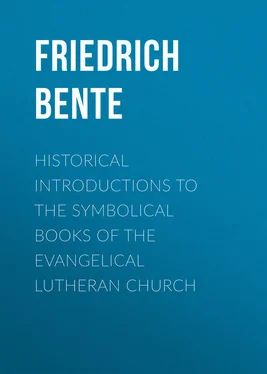Friedrich Bente - Historical Introductions to the Symbolical Books of the Evangelical Lutheran Church
Здесь есть возможность читать онлайн «Friedrich Bente - Historical Introductions to the Symbolical Books of the Evangelical Lutheran Church» — ознакомительный отрывок электронной книги совершенно бесплатно, а после прочтения отрывка купить полную версию. В некоторых случаях можно слушать аудио, скачать через торрент в формате fb2 и присутствует краткое содержание. ISBN: , Жанр: foreign_antique, foreign_prose, на английском языке. Описание произведения, (предисловие) а так же отзывы посетителей доступны на портале библиотеки ЛибКат.
- Название:Historical Introductions to the Symbolical Books of the Evangelical Lutheran Church
- Автор:
- Жанр:
- Год:неизвестен
- ISBN:http://www.gutenberg.org/ebooks/26909
- Рейтинг книги:3 / 5. Голосов: 1
-
Избранное:Добавить в избранное
- Отзывы:
-
Ваша оценка:
- 60
- 1
- 2
- 3
- 4
- 5
Historical Introductions to the Symbolical Books of the Evangelical Lutheran Church: краткое содержание, описание и аннотация
Предлагаем к чтению аннотацию, описание, краткое содержание или предисловие (зависит от того, что написал сам автор книги «Historical Introductions to the Symbolical Books of the Evangelical Lutheran Church»). Если вы не нашли необходимую информацию о книге — напишите в комментариях, мы постараемся отыскать её.
Historical Introductions to the Symbolical Books of the Evangelical Lutheran Church — читать онлайн ознакомительный отрывок
Ниже представлен текст книги, разбитый по страницам. Система сохранения места последней прочитанной страницы, позволяет с удобством читать онлайн бесплатно книгу «Historical Introductions to the Symbolical Books of the Evangelical Lutheran Church», без необходимости каждый раз заново искать на чём Вы остановились. Поставьте закладку, и сможете в любой момент перейти на страницу, на которой закончили чтение.
Интервал:
Закладка:
This agrees with the report Veit Dietrich made to Foerster, May 16, stating: At the first meeting of the committee of the theologians they completed the first nine articles of the Augustana. Blaurer, Wolfart, and some others of those who were doctrinally under suspicion ( nobis suspecti de doctrina ) were present. "However, when the article of the Lord's Supper was to be discussed on the following day, the meeting was prevented, I do not know by whom. It is certain that the princes, too, desired another meeting, because they feared a rupture of the [Smalcald] Alliance, if any doctrinal difference should become evident, which, however, would occur if the matter were thoroughly discussed. Since the disputation was prevented, we were commissioned to write on the Power of the Pope in order to have something to do. Report had it that Blaurer did not approve the Concord of Wittenberg; certainly, he asked Philip for expressions of the Fathers (which are now in my possession), in order to be better furnished with arguments. This prompted Pomeranus and Amsdorf again to convene the theologians against Melanchthon's will. Then the Lord's Supper was discussed. Bucer indeed satisfied all. Blaurer, however, while speaking vaguely of the other matters, nevertheless publicly attacked the statement that the ungodly do not receive the body of Christ." Wolfart declared that he was present at the Concord made at Wittenberg, and had approved it. It was unpleasant for him [Dietrich] when hereupon Stephanus Agricola and then Wolfart rehashed some old statements, vetera quaedam dicta. (370.)
74. Luther's Articles Subscribed
As to the articles of Luther, Veit Dietrich reports that they were privately circulated at Smalcald and read by all. They were also to be read at the meeting of the theologians on February 18. ( C. R. 3, 371.) As a matter of fact, however, neither a public reading nor a real discussion, nor an official adoption resulted. The Strassburg delegates report: "Doctor Martin Luther has also drawn up some special articles, which he purposed to send to the council on his own accord, copies of which we have designated with W." The Strassburgers, then, were in position to send home a copy of these articles. Furthermore Osiander relates in a letter dated February 17: "Besides this, Luther has also written articles at Wittenberg, short indeed, but splendid and keen ( illustres et argutos ), in which everything is summed up in German wherefrom we cannot recede in the council without committing sacrilege. To-morrow we shall read them publicly in our meeting, in order that any one who wishes to add anything to them may present this in the presence of all. They will also, as I hope, deliberate on the [Wittenberg] Concord in the matter concerning the Lord's Supper. I regard Bucer as being sincerely one of us; Blaurer, however, by no means. For Philip tells of his having remarked that he was not able to agree with us." (268.) On February 18, however, Luther was taken ill and an official, public reading and discussion of his articles did not take place on this day nor, as already stated, at a later date.
Luther's articles, however, were nevertheless adopted at Smalcald, though not by the South Germans. When all other business had been transacted, they were presented for voluntary subscription. Bugenhagen had called the theologians together for this purpose. He proposed that now all those who wished ( qui velint ) should sign the articles Luther had brought with him. Hereupon Bucer declared that he had no commission to do this. However, in order to obliterate the impression that he declined to subscribe because of doctrinal differences, he added that he knew nothing in Luther's articles which might be criticized. Blaurer of Constance, Melander of Hesse, and Wolfart of Augsburg followed his example in declaring that they had no commission to sign the articles. In order not to endanger the Smalcald League, Bugenhagen, as appears from his proposition refrained from urging any one to sign. This was also the position of the other theologians.
Veit Dietrich reports: "Bucer was the first to say that he had no orders to sign. He added, however, that he knew of nothing in these articles that could be criticized, but that his magistrates had reasons for instructing him not to sign them. Afterwards Blaurer, Dionysius Melander, and your Boniface [Wolfart of Augsburg] said the same [that they had not been authorized by their superiors to sign]. The thought came to me immediately why Bucer, who taught correctly, should have been the first to refuse his signature, since it was certain that the others, Blaurer and if you will, also your man, would not subscribe because they did not approve of the dogma of the Lord's Supper. This would have led to an open doctrinal schism, which the Elector, Ernst of Lueneburg, and the Counts of Anhalt would, under no circumstances, have tolerated among the confederates. But, since Bucer did not subscribe, it was not necessary to dispute about the doctrine. When we saw this, I was also pleased that Luther's articles received no attention [in the official subscription], and that all subscribed merely to the Augustana and the Concord. And there was no one who refused to do this." (371.)
While thus Bucer, Fagius, Wolfart, Blaurer, and Fontanus refused to affix their signatures, the attending loyal Lutheran theologians endorsed Luther's articles all the more enthusiastically. And while the signatures affixed to the Augustana and the Apology total 32, including the suspected theologians, 44 names appear under Luther's articles. Among these is found also the abnormal subscription of Melander of Hesse: "I subscribe to the Confession, the Apology, and the Concord in the matter of the Eucharist," which is probably to be interpreted as a limitation of Luther's Article of the Lord's Supper.
Although, therefore, the subscription of the Smalcald Articles lacked the official character and was not by order of the Smalcald League as such, it nevertheless is in keeping with the actual facts when the Formula of Concord refers to Luther's Articles as "subscribed at that time [1537] by the chief theologians." (777, 4; 853, 7.) All true Lutheran pastors assembled at Smalcald recognized in Luther's articles their own, spontaneous confession against the Papists as well as against the Zwinglians and other enthusiasts.
75. Endorsed by Princes and Estates
The Thorough Declaration of the Formula of Concord makes the further statement that the Smalcald Articles were to be delivered in the Council at Mantua "in the name of the Estates, Electors, and Princes." (853, 7.) Evidently this is based on Luther's Preface to the Smalcald Articles written 1538, in which he says concerning his Articles: "They have also been accepted and unanimously confessed by our side, and it has been resolved that, in case the Pope with his adherents should ever be so bold as seriously and in good faith, without lying and cheating to hold a truly free Christian Council (as, indeed, he would be in duty bound to do), they be publicly delivered in order to set forth the Confession of our Faith." (455.)
Kolde and others surmise that Luther wrote as he did because, owing to his illness, he was not acquainted with the true situation at Smalcald. Tschackert, too, takes it for granted that Luther, not being sufficiently informed, was under the erroneous impression that the princes and estates as well as the theologians had adopted, and subscribed to, his articles. (300. 302.) Nor has a better theory of solving the difficulty hitherto been advanced. Yet it appears very improbable. If adopted, one must assume that Luther's attention was never drawn to this error of his. For Luther does not merely permit his assertion to stand in the following editions of the Smalcald Articles, but repeats it elsewhere as well. In an opinion written 1541 he writes: "In the second place, I leave the matter as it is found in the articles adopted at Smalcald; I shall not be able to improve on them; nor do I know how to yield anything further." (St. L. 17, 666.)
Читать дальшеИнтервал:
Закладка:
Похожие книги на «Historical Introductions to the Symbolical Books of the Evangelical Lutheran Church»
Представляем Вашему вниманию похожие книги на «Historical Introductions to the Symbolical Books of the Evangelical Lutheran Church» списком для выбора. Мы отобрали схожую по названию и смыслу литературу в надежде предоставить читателям больше вариантов отыскать новые, интересные, ещё непрочитанные произведения.
Обсуждение, отзывы о книге «Historical Introductions to the Symbolical Books of the Evangelical Lutheran Church» и просто собственные мнения читателей. Оставьте ваши комментарии, напишите, что Вы думаете о произведении, его смысле или главных героях. Укажите что конкретно понравилось, а что нет, и почему Вы так считаете.












